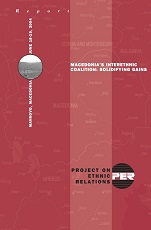Macedonia’s Interethnic Coalition: Solidifying Gains
Macedonia’s Interethnic Coalition: Solidifying Gains
Contributor(s): Allen H. Kassof (Editor), Livia Plaks (Editor)
Subject(s): Inter-Ethnic Relations, Ethnic Minorities Studies
Published by: PER Project on Ethnic Relations
Keywords: Ohrid agreement; multi-ethnic Skopje; ethnic conflict in Macedonia;
Summary/Abstract: The first day of this two-day meeting was attended by representatives of the parties making up the governing coalition: the Social Democratic Alliance of Macedonia (SDSM), the Democratic Union for Integration (DUI), the Liberal Democratic Party (LDP), the Democratic League of Bosnjaks in Macedonia, the Democratic Party of Serbs in Macedonia, the Democratic Party of Turks in Macedonia, and the United Party of the Roma in Macedonia. They were joined on the second day by their colleagues from the opposition parties, the Internal Macedonian Revolutionary Organization-Democratic Party of Macedonian National Unity (VMRO-DPMNE), the Democratic Party of Albanians (DPA), the Party for Democratic Prosperity (PDP), and the Liberal Party (LP).
The roundtable began with a discussion of what has been achieved by the interethnic governing coalition, and the impact of their accomplishments on the country.
The international participants praised Macedonia, which, they said, had become an example for the region in improving interethnic relations. Indeed, they noted, recently some leaders from Kosovo have been examining the Ohrid Framework Agreement (OFA) as one model of what could be accomplished with self-restraint and political will. In their turn, the participants from Macedonia stressed the benefits that they derive from the Mavrovo meetings in clarifying the positions of the respective political partners, anticipating future problems and solutions, and in providing guidelines on how to communicate with the media and the public.
The participants agreed that the most urgent current topic is decentralization. While decentralization was on the agenda of each of the previous meetings, said one participant, we managed to avoid sufficient discussion of it. This time, even though decentralization is not the main topic on the agenda, it is where we now need to focus our attention.
Series: PER Reports
- Page Count: 18
- Publication Year: 2004
- Language: English
- Content File-PDF

